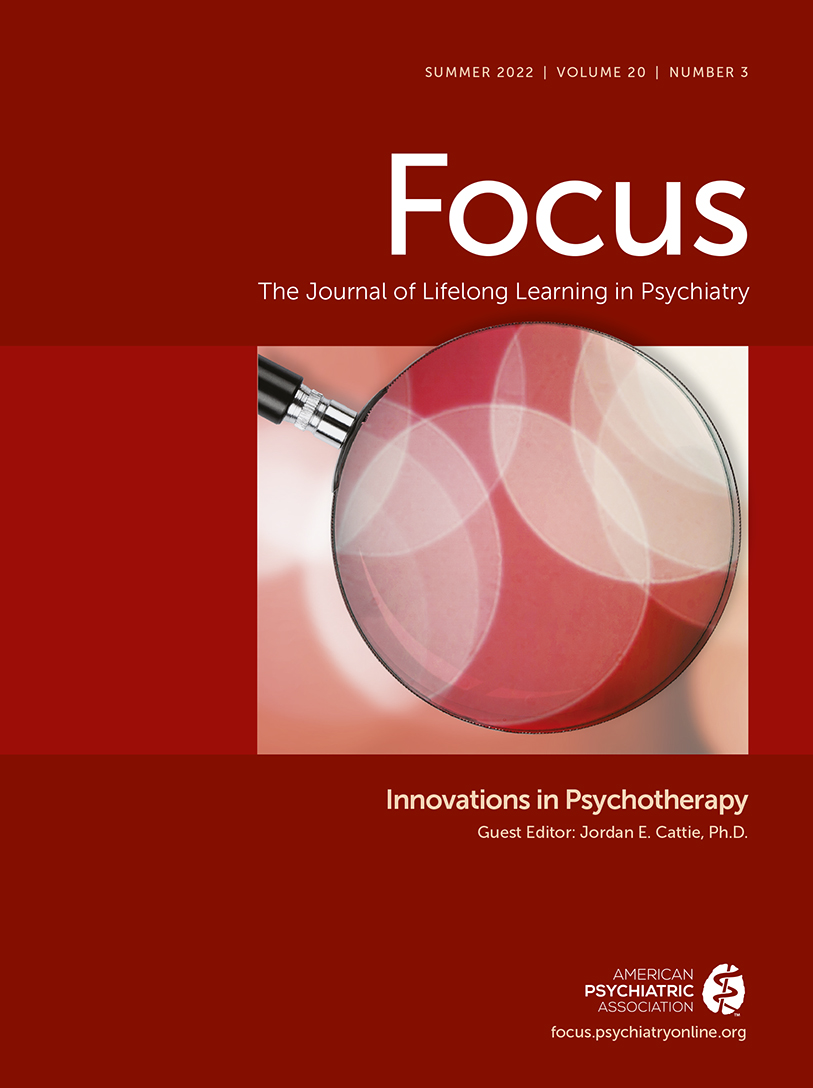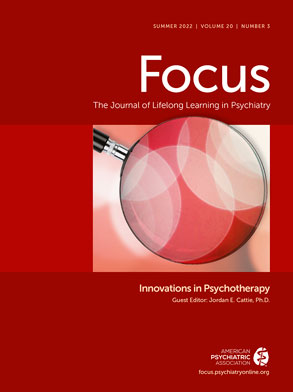Given space limitations and varying reprint permission policies, not all of the influential publications the editors considered reprinting in this issue could be included. This section contains abstracts from additional articles the editors deemed well worth reviewing.
Radical Healing in Psychotherapy: Addressing the Wounds of Racism-Related Stress and Trauma
Adames HY, Chavez-Dueñas NY, Lewis JA, et al.
Psychotherapy (Epub ahead of print, Mar 10, 2022). doi: 10.1037/pst0000435
There is a large body of research on the importance of addressing culture in psychotherapy. However, less is known about providing critically conscious and racially affirmative therapy for Black, Indigenous, and People of Color (BIPOC) clients in the context of ongoing systemic racism and racism-related stress and trauma, especially in the sociopolitical context of the United States. This article introduces and illustrates the Keeping Radical Healing in Mind Therapeutic Approach using a sample therapy session. To contextualize the therapeutic approach, we outline the need for antiracist and liberatory approaches to psychotherapy and describe in detail the Psychology of Radical Healing theoretical framework. The clinical stance that underpins the Keeping Radical Healing in Mind Therapeutic Approach includes helping clients develop, internalize, and nurture (a) Critical Consciousness, (b) Cultural Authenticity and Self-Knowledge, (c) Radical Hope and Envisioning Possibilities, (d) Collectivism, and (e) Strength and Resistance. To better meet the needs of BIPOC clients, the stance requires clinicians to develop their critical consciousness of systemic racism and interlocking forms of oppression. The clinical case of “Brenda,” a Black woman experiencing the effects of racism-related stress while raising a young Black boy, is presented.
Copyright 2022 American Psychological Association. Reproduced with permission.
Mindfulness and Acceptance-Based Interventions With Black Americans: A Meta-Analysis of Intervention Efficacy for Depressive Symptoms
Dawson DN, Jones MC, Fairbairn CE, et al.
J Consult Clin Psychol 2022; 90:123–136
OBJECTIVE: A growing literature supports mindfulness and acceptance-based interventions (MABIs) for depression prevention and treatment with individuals from dominant cultural groups, and MABIs have been theorized to be well suited to resonate with individuals from nondominant groups. The aim of the current meta-analysis was to determine whether this promise is realized in practice by evaluating the efficacy of MABIs for depression symptoms in Black Americans.
METHOD: Thirty studies with an adequate proportion (>20%) of Black Americans were identified using previous reviews and electronic databases, yielding a total of 1,703 participants with an average proportion of 70% Black Americans. Data on moderators (i.e., geographic location, study design, and intervention protocol) and outcomes were extracted and analyzed using metaregression.
RESULTS: Results indicated a moderate effect of MABIs on symptom outcomes in the full sample g=0.48. Effect sizes were similar in study subsets comprising majority (>50%; k=19) g=0.39, and predominantly (>90%; k=10) g=0.35, Black participants, with no significant moderating effect of racial composition. Effects were moderated by both sample and intervention level characteristics.
CONCLUSIONS: The current findings support the conclusion that MABIs are efficacious to varying degrees for Black Americans; with stronger support for use in adult samples than youth samples. These results are promising, and further support efforts to expand research on evidence-based treatments (EBTs) to meet the specific mental health needs of Black Americans.
Copyright 2022 American Psychological Association. Reproduced with permission.
IHI Framework for Improving Joy in Work
Perlo J, Balik B, Swenson S, et al.
IHI White Paper. Cambridge, MA, Institute for Healthcare Improvement, 2017
The Institute for Healthcare Improvement has produced a white paper intended to serve as a guide for health care organizations, teams, and individuals to improve joy in work that provides four steps for leaders to take and nine components of a system.
National Guidelines for Behavioral Health Crisis Care–A Best Practice Toolkit
Substance Abuse and Mental Health Services Administration
Rockville, MD, Substance Abuse and Mental Health Services Administration, 2020
The Substance Abuse and Mental Health Services Administration has provided the National Guidelines for Behavioral Health Care Best Practice Toolkit to assist states and communities with the development and implementation of effective systems and crisis services that are available for anyone, anywhere, and anytime.
Inclusion of SAMHSA content does not constitute or imply endorsement or recommendation by the Substance Abuse and Mental Health Services Administration, the U.S. Department of Health and Human Services, or the U.S. Government.

